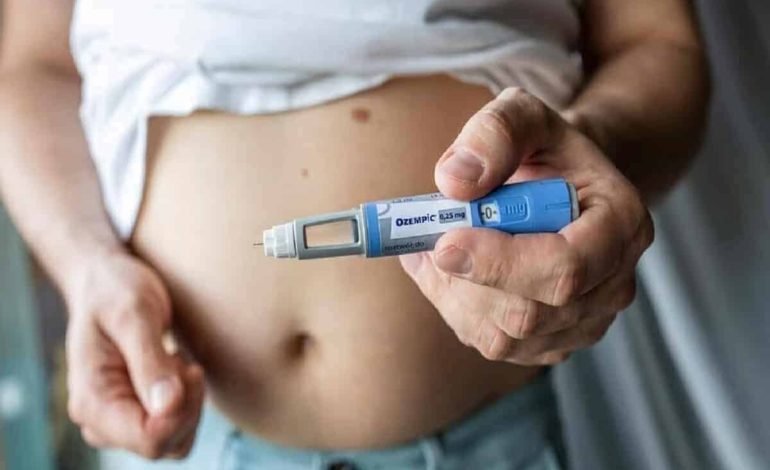
For too long, the narrative around weight loss has been oversimplified. Eat less, move more, and if you can’t, it’s down to your lack of willpower. This fostered a culture of stigma around those who struggled with perceptions of laziness, weakness and greediness. Whilst others who triumphed were hailed as paragons of resolve. An even darker subculture that resulted led many down a path of disordered eating, with the association of eating less attached to one’s virtue and superior moral fibre.
Now we have the GLP‑1 era: the arrival of “The Magic Pill”, so named by journalist Johann Hari in his book by the same name. Medications like Ozempic, Wegovy, and Mounjaro have transformed our understanding of weight management.
Glucagon‑like peptide‑1 (GLP‑1) is a naturally occurring hormone in the body that plays a critical role in regulating hunger and craving signals as well as blood sugar levels. When receptors for this hormone are triggered, they send a message to the brain’s appetite centre that the body is full and satisfied. If any complications arise in this process, those hunger or craving signals can go awry. Excessive hunger, it appears, may not stem from a lack of self‑discipline but rather from a hormonal imbalance. This biological insight fundamentally challenges long‑held beliefs about weight control. A study published in Nutrients proposes that this phenomenon of heightened reactivity to food cues be termed “food noise”. These groundbreaking medications operate by replicating the glucagon‑like peptide‑1 (GLP‑1) and therefore curtailing hunger and cravings, leading to greater weight loss.
The success of GLP‑1 treatments encourages us to rethink our approach to weight management. Instead of framing it strictly as a personal trial of character, we can begin to view it as a complex interplay of biology, environment, psychology and behaviour. Individual choices undeniably play a vital role, but those choices exist within biological constraints that differ greatly from one person to another. These medications mimic the effects of a hormone called glucagon‑like peptide‑1, which regulates appetite and craving signalling in the brain. By enhancing feelings of satiety and reducing cravings, GLP‑1 agonists can help individuals manage their urges, making it easier to resist unhealthy habits.
These groundbreaking medications, primarily used for treating type 2 diabetes and now obesity, have also shown promise in addressing cravings for more than just food by influencing dopamine pathways, potentially leading to reduced reward‑seeking behaviours. Dopamine is a neurotransmitter involved in feelings of reward, motivation and pleasure. It plays a crucial role in reinforcement behaviour, mood regulation and decision making. When things go awry with these pathways, people can experience addictive behaviours, ranging from food, alcohol and substance use disorders to porn, sex and gambling addictions.
Hunger is highly individualised. What one person experiences as mildly peckish could feel like a ravenous, insatiable hunger to another. This vast variation highlights the need to recognise personal biochemical differences in hunger cues and responses.
Homeostasis is the body’s unconscious regulatory system that acts to achieve a balance. In a healthily functioning individual the body sends fullness and hunger signals at the right times in the right amounts, resulting in a healthy body weight. If these signals are affected, the individual may be hungrier and eat more than they require, leading to increased body weight.
Our modern food environment bombards us with easy access to hyper‑palatable, calorie‑dense foods, which can overwhelm our biological regulatory systems, throwing them out of whack and complicating weight management. These ultra‑processed foods are highly addictive, changing neurological pathways in the brain. TV presenter Dr Chris van Tulleken challenged himself to eat a diet made up of mostly ultra‑processed foods for a month. Brain activity scans showed the areas of Chris’ brain responsible for reward had linked up with the areas that drive repetitive, automatic behaviour. “Eating ultra‑processed food became something my brain simply tells me to do, without me even wanting it,” he says, adding this is a similar brain response to taking substances we consider classically addictive such as cigarettes, alcohol and drugs.
Although there are numerous genetic, epigenetic and environmental factors that can contribute to body size, it is important to note that just taking these medications without proper nutritional and exercise guidance can lead to weight regain once these medications are stopped. Without adequate nutrients, muscle and bone loss can be a very serious side effect. Weight‑bearing exercise can be an essential tool in mitigating these effects.
Other side effects that are worth noting include the reduced absorption of progesterone in the contraceptive pill and HRT. This has led to many unplanned pregnancies. The effects on HRT are more subtle and lesser known, with many women receiving no advice from their GP to up the progesterone component of their HRT regime. Progesterone is responsible for protecting the uterus; without adequate levels, women are left vulnerable to many health complications, including cancer.
Another huge risk factor with these drugs is their effect on alcohol metabolism. GLP‑1 receptor agonists enhance insulin release and reduce glucagon secretion, which can overstimulate pancreatic cells, potentially leading to inflammation in susceptible individuals. Both GLP‑1 medications and alcohol are known to trigger pancreatitis. Consuming both together increases this risk. Many people are being prescribed these medications without proper guidance to stop drinking alcohol.
Even the most determined individuals can only resist powerful biological urges for so long. Recognising the finite nature of willpower can lead to a more compassionate view of those facing weight challenges. Combining comprehensive advice on side effects, contraindications, nutritional counselling and exercise guidance should all be included in any GLP‑1 prescription. How our NHS could fund this is a challenge for our government. Good luck, Keir!
As we stand at the cusp of a new understanding in weight loss, these insights may not only alleviate the stigma often associated with weight struggles but also pave the way for more effective and empathetic approaches to addiction, health and well‑being.
For more insights into health, wellbeing and the latest breakthroughs in treatments and lifestyle approaches, visit EyeOnLondon. We’d love to hear your thoughts – share your views in the comments and be part of the conversation.
Follow us on:
Subscribe to our YouTube channel for the latest videos and updates!
We value your thoughts! Share your feedback and help us make EyeOnLondon even better!









